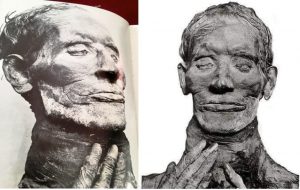His corpse did not decompose and his coffin contains “gifts of the king.” Why does an Egyptian scientist believe that the tomb of the Prophet Joseph was discovered?
In 2018, the Egyptian Museum in Cairo announced the reintroduction of the treasures of Yuya and Tuya for the first time since their discovery in 1905, with the complete collection of historical discovery, to come as a surprise to fans of Egyptian antiquities. Who are Yuya and Tuya? And how important is the display of their holdings?
After the collection of Tutankhamun left the Egyptian Museum for display in the Great Museum located in the pyramid area, a new group of stores came out of the Egyptian Museum to replace the collection of the Pharaonic king. And Yuya and Toya have an exciting story that made them the center of attention for those interested as soon as their show was announced.
The last chapters of excitement, and questions about Yuya and Tuya were a theory saying that “Yuya” is one of the brothers of the Prophet Yusuf, peace be upon him, and some went to say that he is the tomb of the Prophet of God Yusuf, whose story is mentioned in the Qur’an with a surah bearing his name, based on some evidence that is similar to the life of the son of the Prophet Jacob (Ya^qoub).

The First Evidence
The name “Yuya” is not Egyptian, and historians of that era wrote it in several ways, which indicates the ignorance of bloggers of his era with his unusual name on their culture, which was confirmed by Justin Maspero himself and he himself attended the discovery of the tomb, and noted that the Egyptians wrote his name in more than one way, Among them are Yuya, Yue, Yaya, and Yui.
The Second Evidence
When Joseph interpreted the dream of the “seven cows” to the King of Egypt, the king gave him gifts, mentioned in the Torah, which is the king’s seal, evidence of his kingship and influence, and a war wheel out of two rare wheels belonging to the King of Egypt, and a golden ring, which was found in Yuya’s tomb. , except for the ring that was stolen during the discovery of the tomb.
The Third Evidence
To confirm that Yuya is not Egyptian, anatomists noted that his features were foreign, unlike those of his wife, Toya, and the Prophet Yusuf was not actually Egyptian, in addition to his unusual handsomeness compared to the fact that he died at the age of 110.
The Fourth Evidence
The mummy was not subjected to decomposition like the rest of the mummies, which is a sign of his prophecy according to Islamic beliefs, as it was mentioned in a hadith of the Prophet Muhammad, “God has forbidden the earth to eat the bodies of the prophets,” and that they are alive in their graves praying, so that the features of his blond hair still appear on the mummy to this day.
The Fifth Guide
His tomb was devoid of any drawings or inscriptions, despite its presence in the midst of the tombs of kings and princes, which were teeming with drawings and decorations, which is what scholars see as a sign of his prophecy, as he did not embrace the religion of the Pharaohs and did not believe in their pagan beliefs, but was a monotheist who believed in God, and not in several gods as The Egyptians believed. And that he believed that the religion with God is Islam, and that God has no partner or likeness or likeness to Him.
The Sixth Guide
He was buried in a royal tomb, unlike all the ministers in ancient Egypt, which is what the Egyptian archaeologist Ahmed Othman and others who confirm the same theory see as an indication that he was “the dearest of Egypt” as described by the Qur’an, and that he had a position close to that of kings and princes.
- In summary, with this evidence, there are still those who reject this theory and consider it illogical, and it is indeed so, such as the famous Egyptian archaeologist and former Minister of State for Antiquities Affairs Zahi Hawass; Given that the title “Father of the Pharaoh” was not exceptional for King “Yuya”, and that everything contained in this theory is just speculation without firm foundations on his being the Prophet Yusuf, peace be upon him, as there are two narrations about the tomb of our master Joseph, peace be upon him. That God Almighty had revealed to our master Moses, peace be upon him, to bury our master Joseph, peace be upon him, to Bayt Al-Maqdis with his family. In the narration, when our master Yusuf died, the people quarrel over him, and each of them wanted to bury him near them so that his blessings, peace be upon him, might reach them. He took him out of the water and buried him in Jerusalem next to our master Ibrahim, peace be upon him, and God Knows best.
Sunna Files Free Newsletter - اشترك في جريدتنا المجانية
Stay updated with our latest reports, news, designs, and more by subscribing to our newsletter! Delivered straight to your inbox twice a month, our newsletter keeps you in the loop with the most important updates from our website












